Abacus Data Poll: Conservatives lead by 17.
February 25, 2024
From February 15 to 21, 2024, Abacus Data conducted a national survey of 2,125 adults exploring several topics related to Canadian politics and current events as part of our regular national omnibus surveys.
In this edition of our Canadian politics tracking, we report on our usual metrics along with some new data on who Canadians prefer as Prime Minister and how people feel about the focus the Liberal government is giving to some key issues.
Note, this survey was done following the Auditor General’s report on the ArriveCan app but before news leaked about the deal between the NDP and Liberals on national pharmacare.
Conservatives lead by 17 over the Liberals. It’s been 644 straight days that the Conservatives have led the Liberals in Abacus Data polling.
If an election were held today, 41% of committed voters would vote Conservatives with the Liberals at 24%, the NDP at 19% and the Greens at 5%. The BQ is at 35% in Quebec.
Since our last survey, the Conservatives are down 2, the Liberals are unchanged, and the NDP is up 1. For all intents and purposes, little has changed in the ballot. 15% of Canadians say they are undecided including 13% of those who say they voted Liberal in 2021 (it’s 5% among past Conservative voters).
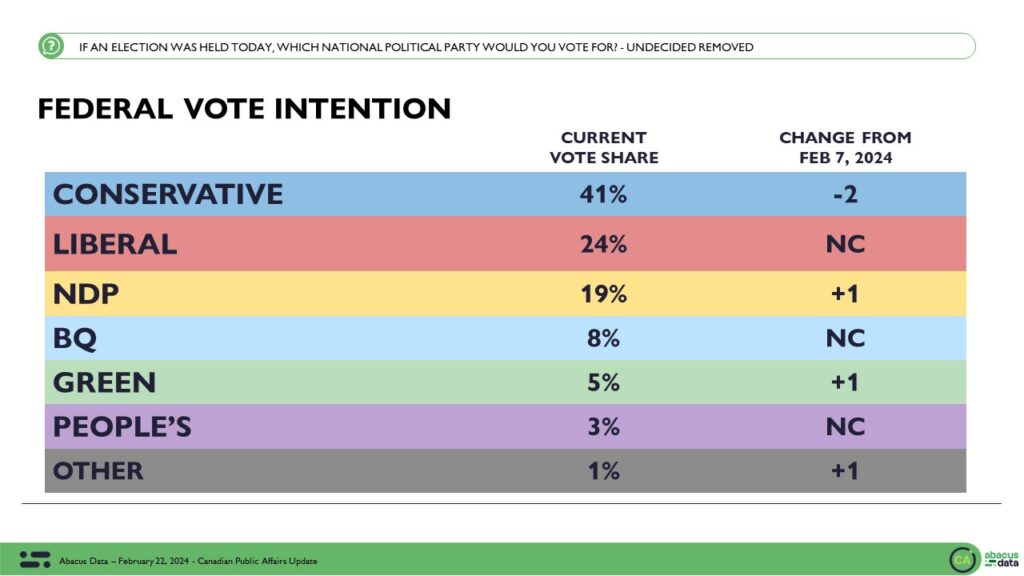
Regionally, the Conservatives are well ahead in the Prairies, lead by 14 in BC, and 16 in Ontario. In Atlantic Canada, the Conservatives are 20-points ahead of the Liberals while in Quebec, the BQ leads by 7 over the Liberals with the Conservatives six points further behind.
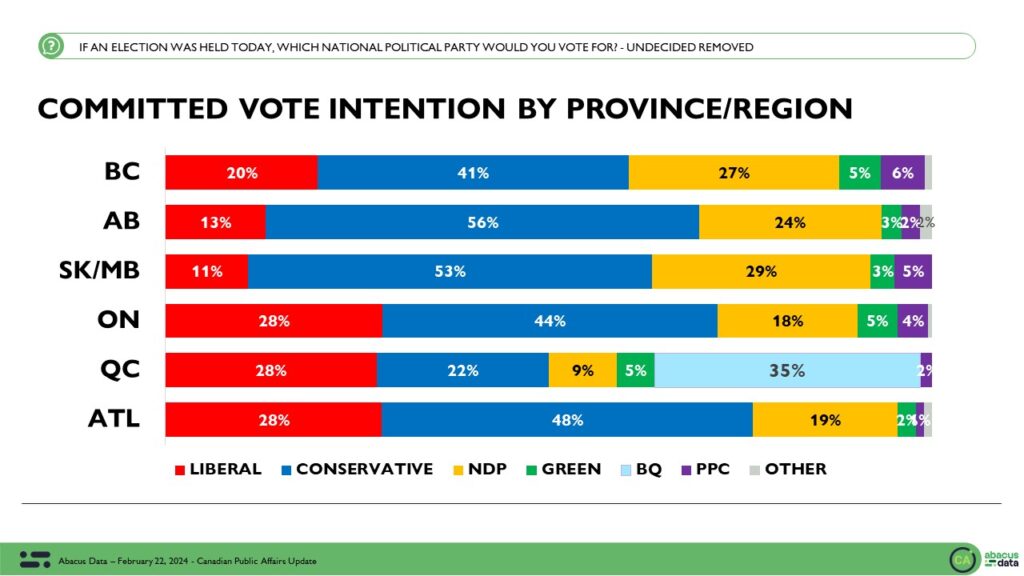
If we isolate British Columbia, Ontario, and Atlantic Canada only, we find the Conservatives and Liberals both down 1 with the Conservatives ahead by 17 in these three provinces/regions.
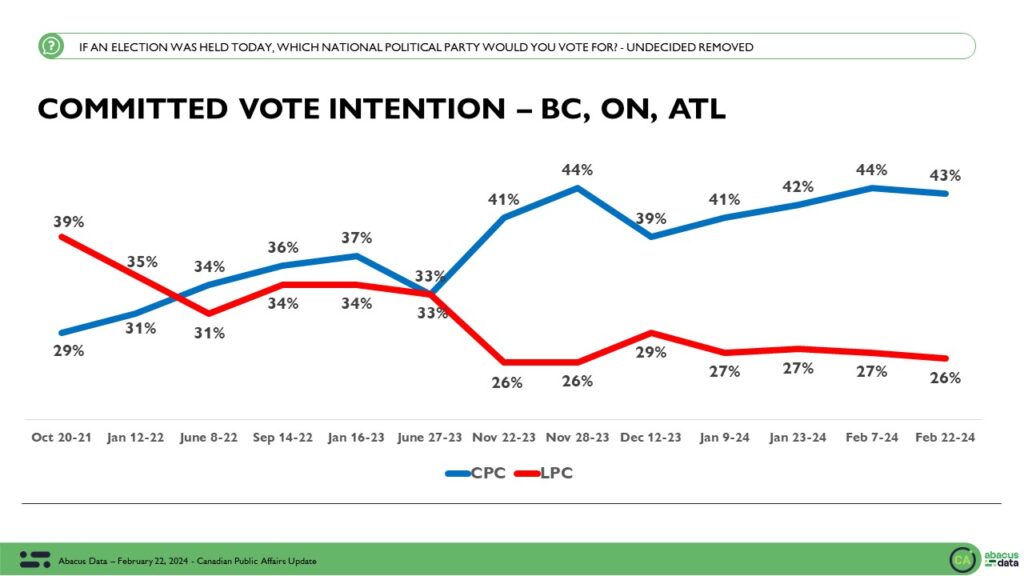
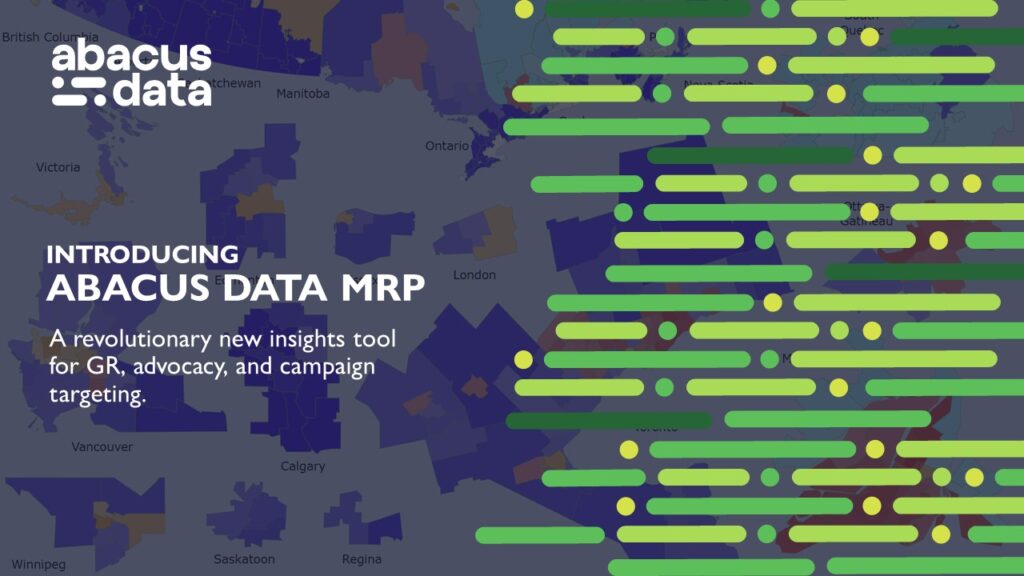
Demographically, the Conservatives lead among all age groups with the Liberal vote share correlated with age. The Liberal vote share rises as the age of the respondent increases. The opposite is true for the NDP. For a deeper analysis of how millennials have shifted their preferences over the past 8 years, see my substack here.
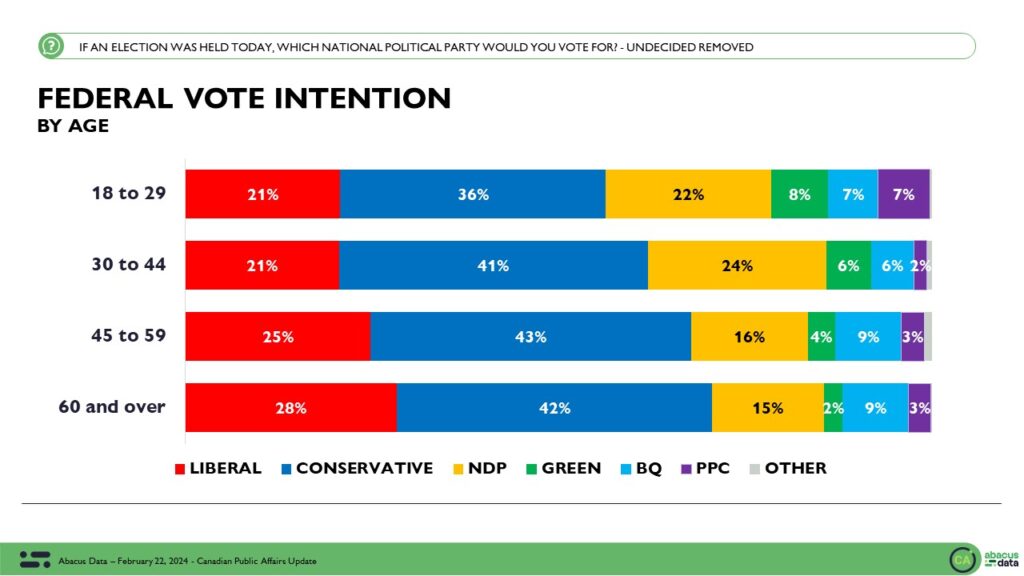
Men are 10-points more likely to vote Conservative than women and 4-points and 7-points less likely to vote Liberal and NDP respectively. The Conservatives lead by 20 among men under 30, while the NDP is ahead by 5 over the Conservatives among women under 30. The Conservatives lead by 25 among men 60+ while the Conservatives and Liberals are statistically tied among women 60+.
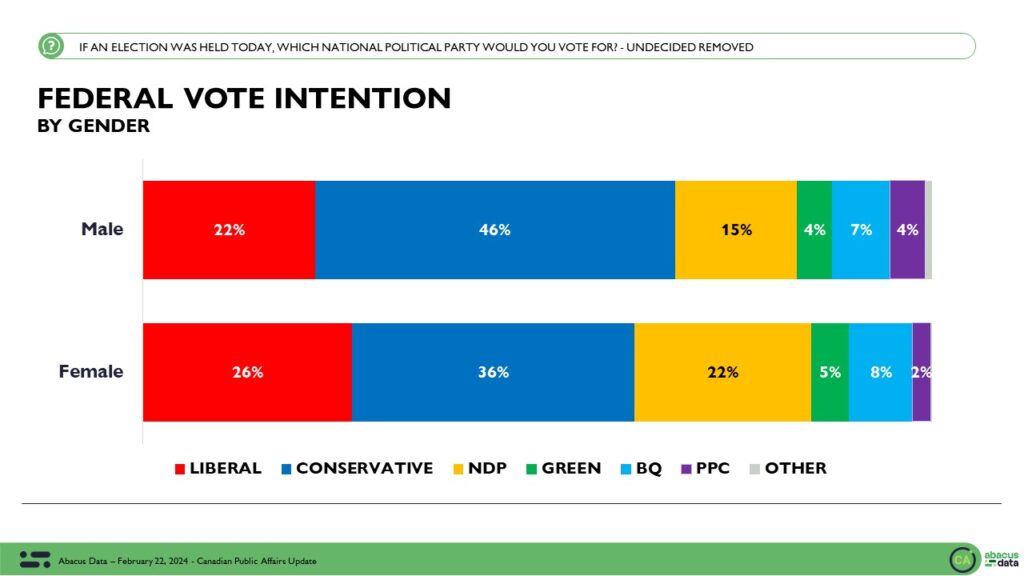
When we ask people if they would consider voting for each of the main political parties, 52% say they are open to voting Conservative (down 2 since earlier this month) while, 40% are open to voting NDP (down 1), and 39% are open to voting Liberal (down 1) and the lowest we have measured for the Liberals since they were elected in 2015.
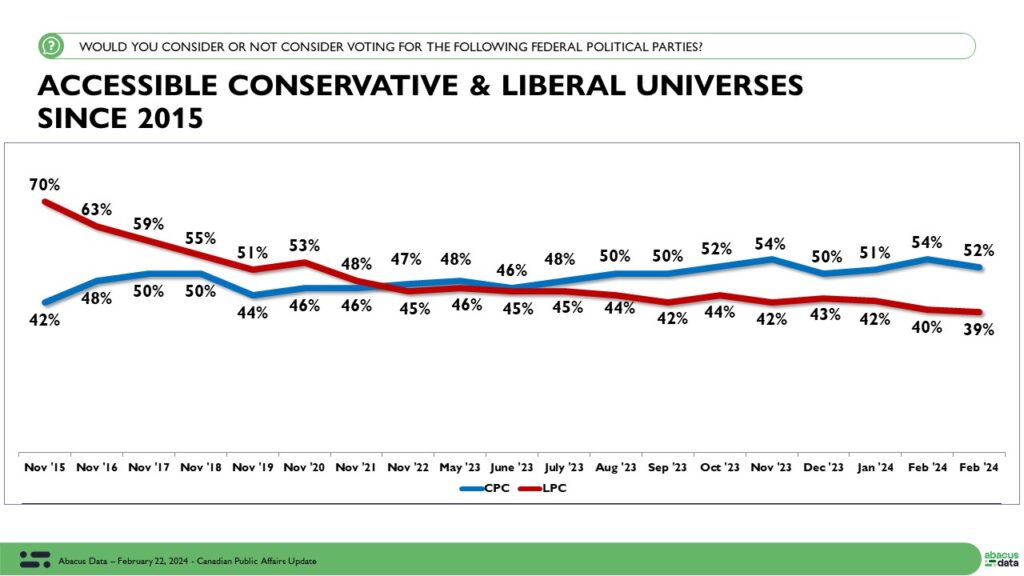

We continue to measure voter motivation by political party.
We find that Conservative supporters are more likely to say they would vote than Liberal or NDP supporters. The enthusisiam gap is consistent with what we found earlier this month.
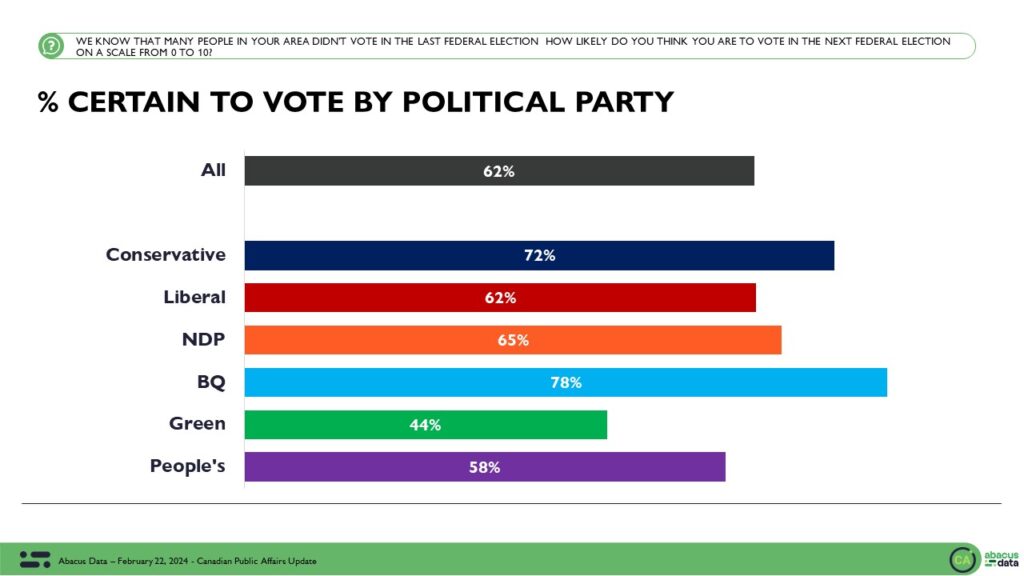
What else are Canadians thinking?
The mood of the country hasn’t changed since earlier this month and has been fairly consistent since the start of the year. Today, only 1 in 4 think Canada is headed in the right direction and only 15% feel optimistic about the direction of the world as a whole. This mood continues to be very sour.
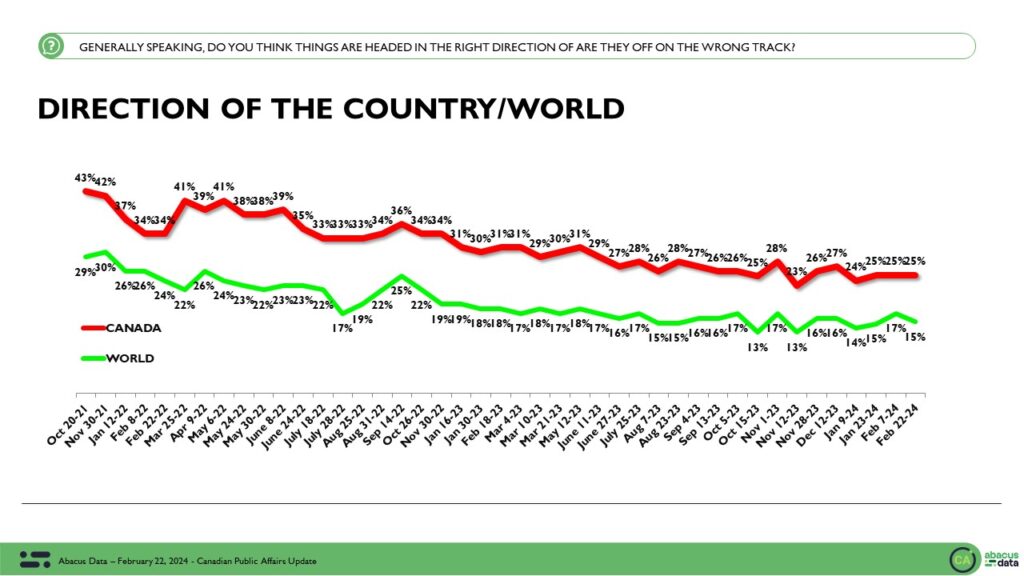
The federal government’s approval rating is unchanged from earlier in the month at 24%, the lowest we have measured since the Liberals were elected in 2015. 59% disapprove of the job performance of the federal govenrment led by Justin Trudeau, also unchanged.
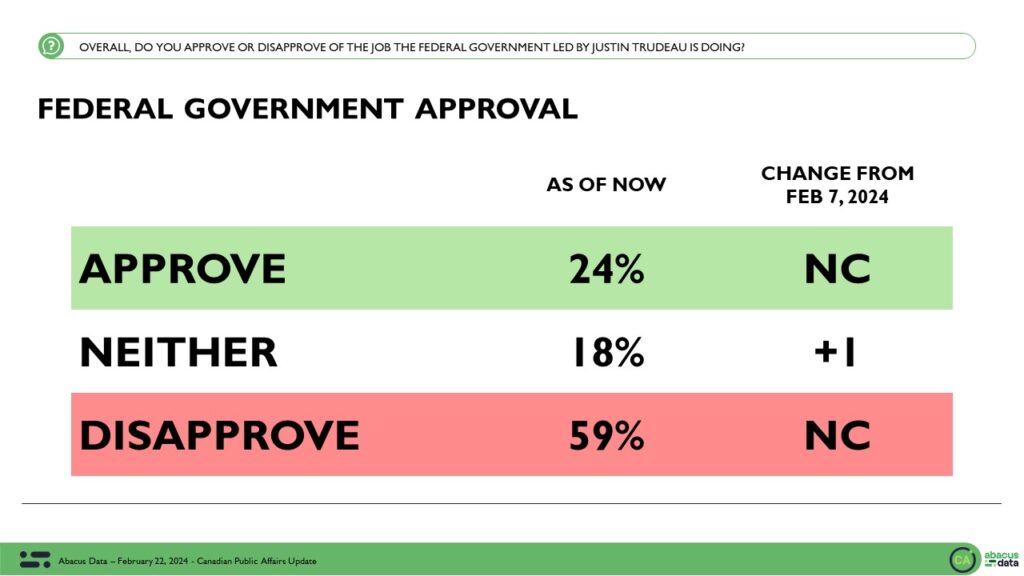
It’s also clear that impressions of the federal government’s performance are strongly linked to impressions of Justin Trudeau. One moves with the other. 92% of those with a negative impression of Justin Trudeau also disapprove of the federal government’s job performance.
Impressions of Justin Trudeau have become marginally more negative. 59% have a negative impression of the Prime Minister and 23% have a positive view for a net score of -36.
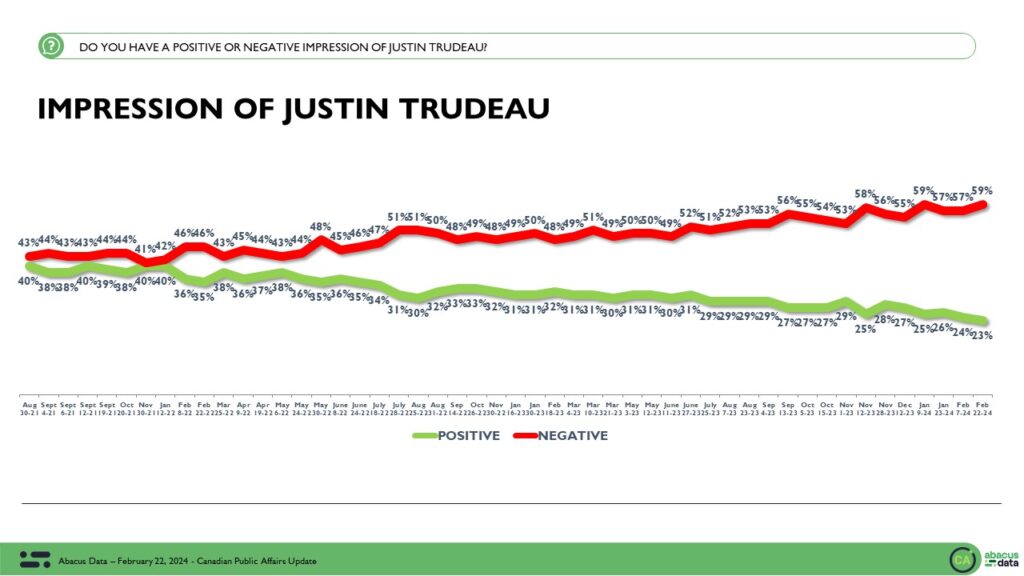
In contrast, impressions of Pierre Poilievre are also unchanged with 37% viewing him positively and 36% negatively for a net score of +1. Any attempts by the Liberals to shift perceptions about Poilievre have yet to bare any fruit.
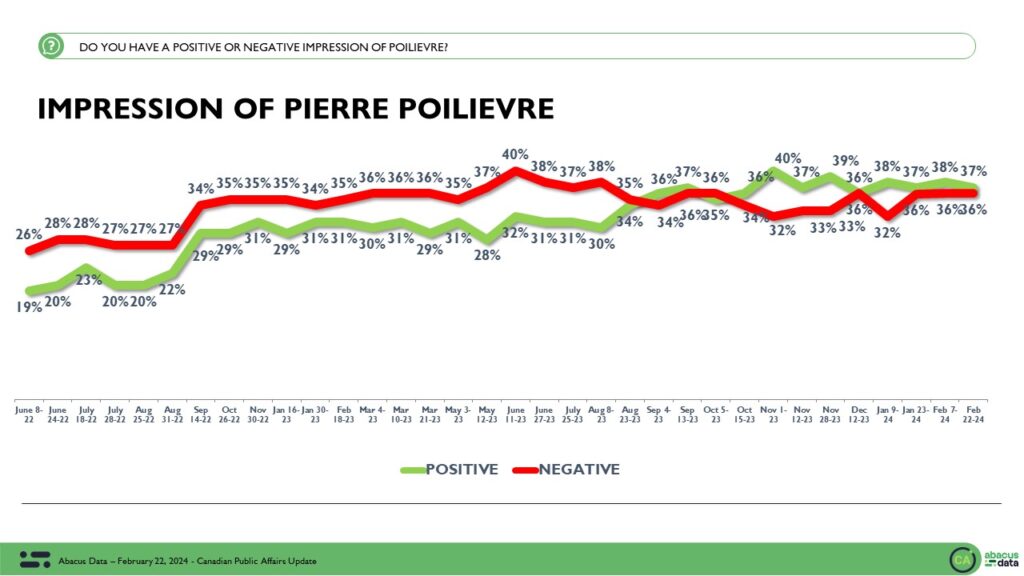
Feelings about NDP Leader Jagmeet Singh are largely unchanged. Today 35% have a negative impression compared with 32% who have a positive one for a net score of -3.
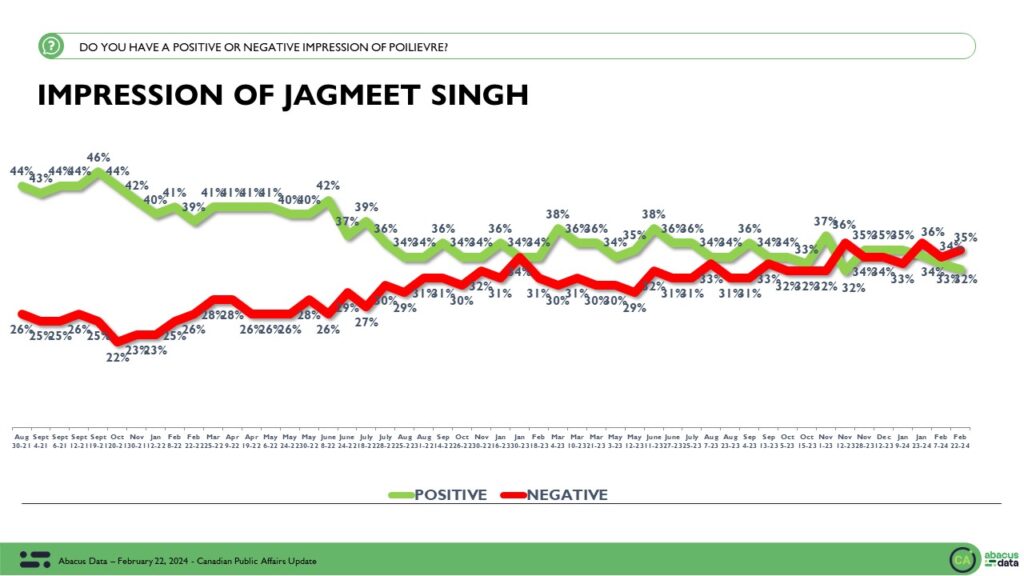
15% of Canadian adults believe Justin Trudeau and the Liberals deserve to be re-elected, up 1 point from earlier in the month while those who think it’s time for a change and feel there’s an acceptable alternative is down 3 points in a month to 51%. We will continue to monitor this perception as it may be a leading indicator for vote intention.
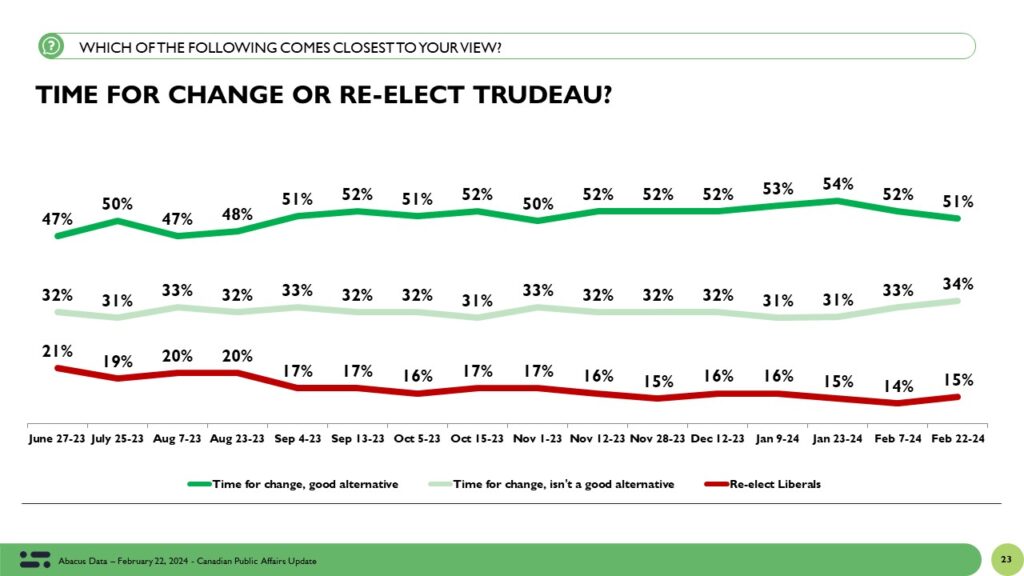
What Canadians feel are the top issues facing the country are fairly stable although housing affordability is up 2 points while healthcare is down 2. The percentage rating the economy as a top issue is up 3 over the past two weeks.
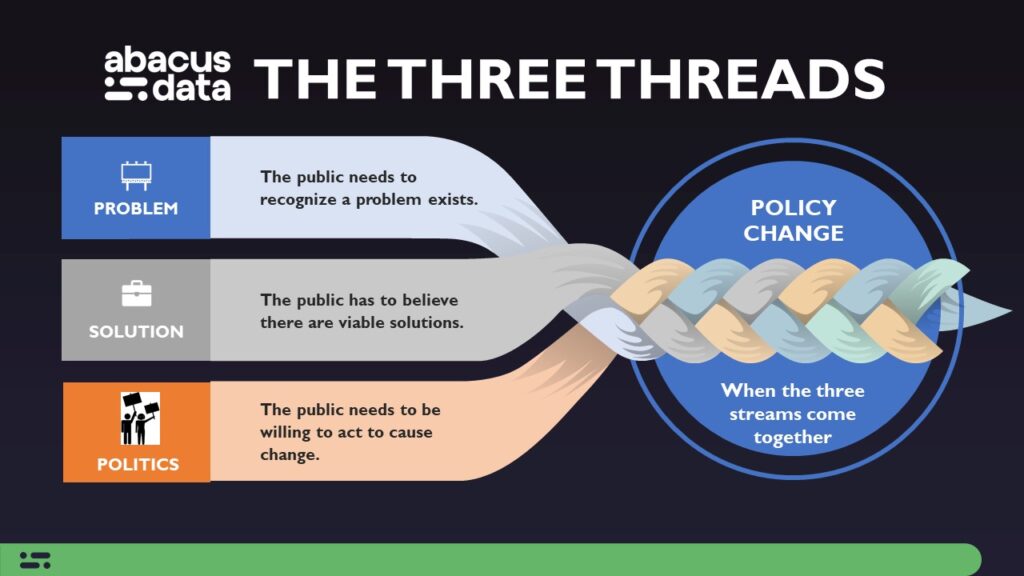
at polling for public affairs and advocacy.
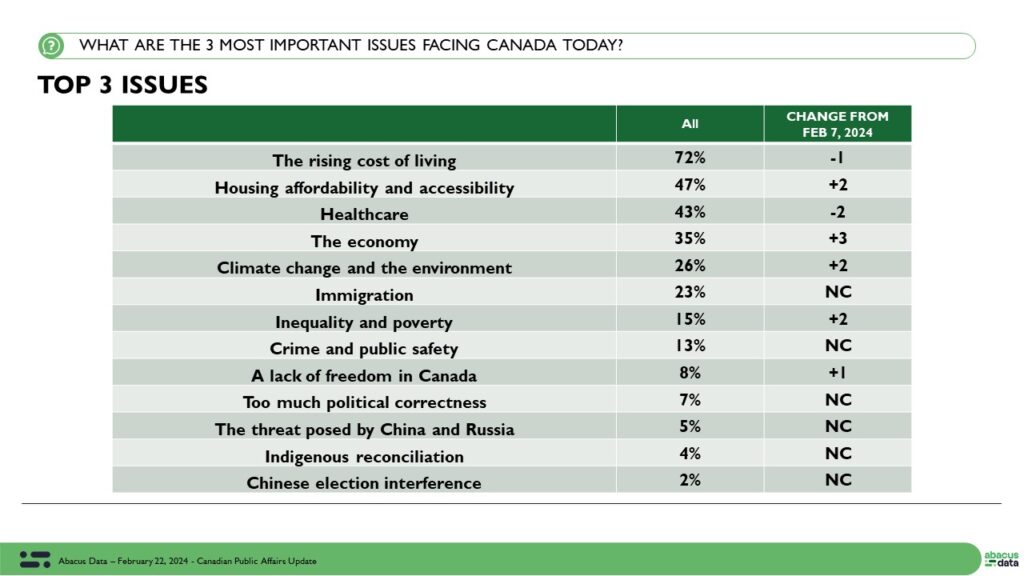
Compared with last Fall, more Canadians think the Conservatives will win the next federal election. Almost half of Canadians believe the Conservatives will win the next election, up 6 points since October 2023. 19% think the Liberals will, down 2 while 10% think the NDP will win. 1 in 4 Canadians are unsure or say another party will win.
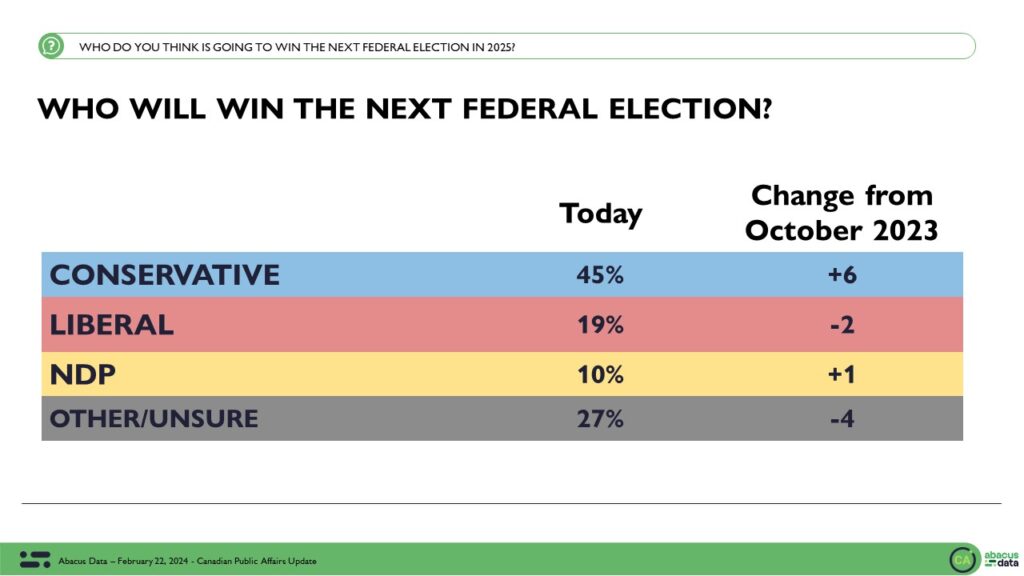
We also reasked who Canadian prefer to be Prime Minister – Trudeau or Poilievre. Poilievre is ahead by 10, largely unchanged from last month. Among current NDP supporters 66% side with Trudeau while 34% side with Poilievre. Among BQ supporters, 64% side with Trudeau while 36% side with Poilievre.
In this survey, we asked people who they prefer between Pierre Poilievre and Jagmeet Singh. The results are the only marginally better for Mr. Singh. 54% prefer Poilievre while 46% prefer Singh. Among currentl Liberal supporters, 73% would choose Mr. Singh while 27% would choose Mr. Poilievre. Among BQ supporters, 60% side with Singh while 40% side with Poilievre.
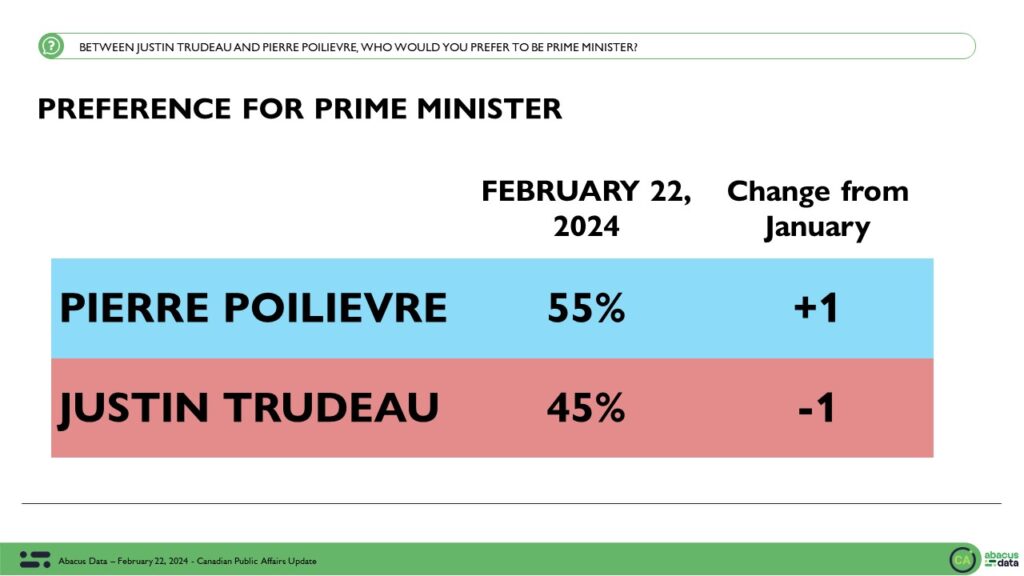
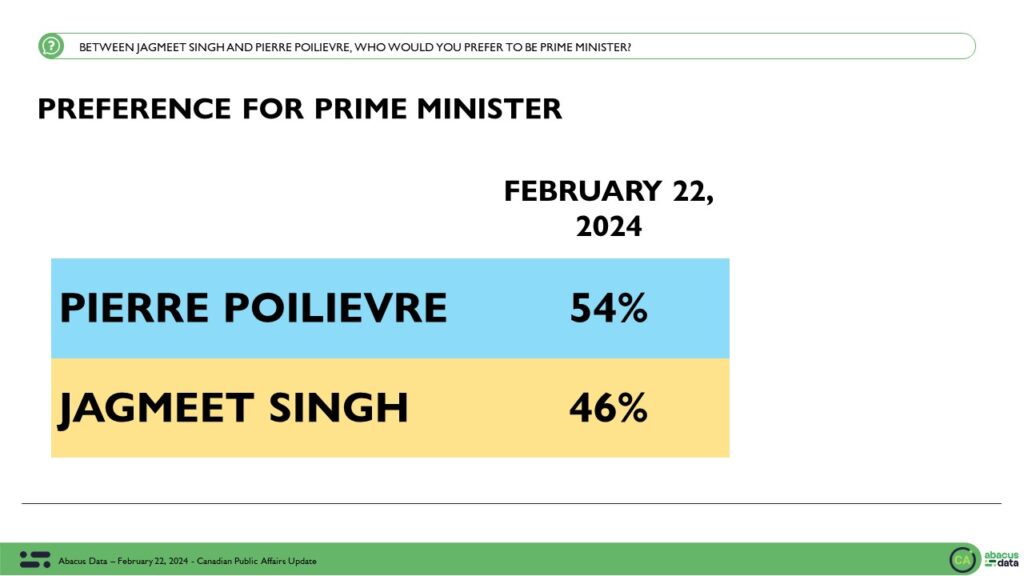
Finally, in this survey we reasked questions we asked in January 2023 exploring whether Canadians feel the Liberal government is focused too much, too little, or about the right amount on several issues.
The results reveal several things.
When it comes to the cost of living (the top issue for about 3 in 4 Canadians), housing, and crime and public safety at least six in ten believe the government is not focused enough as they should be. Compared with a year ago, those who think the government isn’t focused enough on the cost of living is up 5-points.
In contrast, at least a quarter of Canadians think the government is focused too much on climate change, indigenous reconciliation, and Russia’s invasion of Ukreaine.
Climate change is a very interesting issue. It is the most polarizing of any issue with about equal numbers of people feeling the government is too focused on the issue than those who think it is not focused enough.
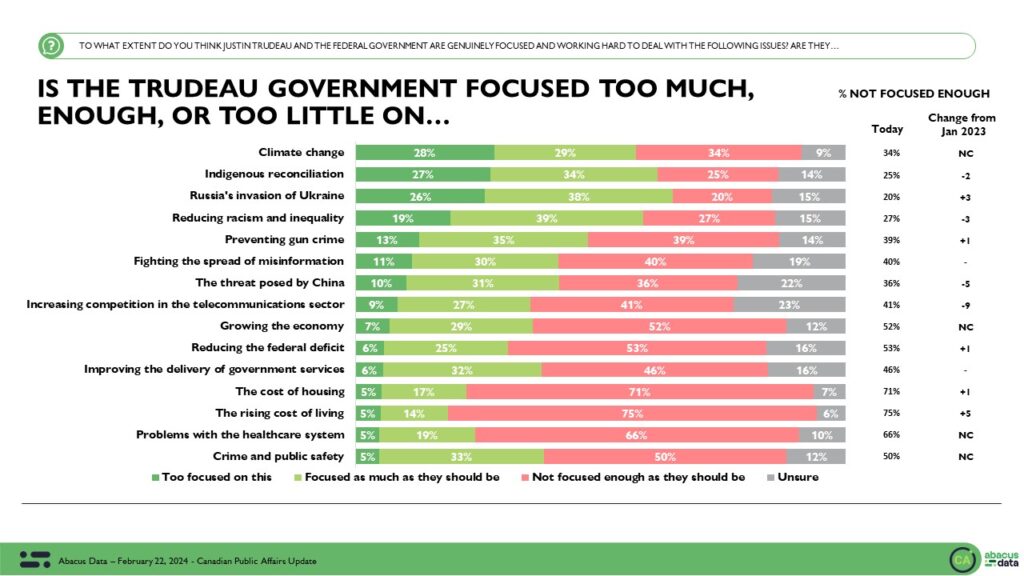
We also reasked whether people think the Conservative Party, if it formed government with Pierre Poilievre as Prime Minister, would focus more, about the same, or less than the Liberal government on the same issues.
Almost half of Canadians think a Conservative government will focus more than the Liberal government on the cost of living (up 7 since last year), growing the economy (up 2), reducing the deficit (up 1) and the cost of housing (up 5).
At the same time, a third or more believe a Conservative government would be less focused on climate change, Russia’s invasion on Ukraine (down 4 since last year), and indigenous reconciliation.
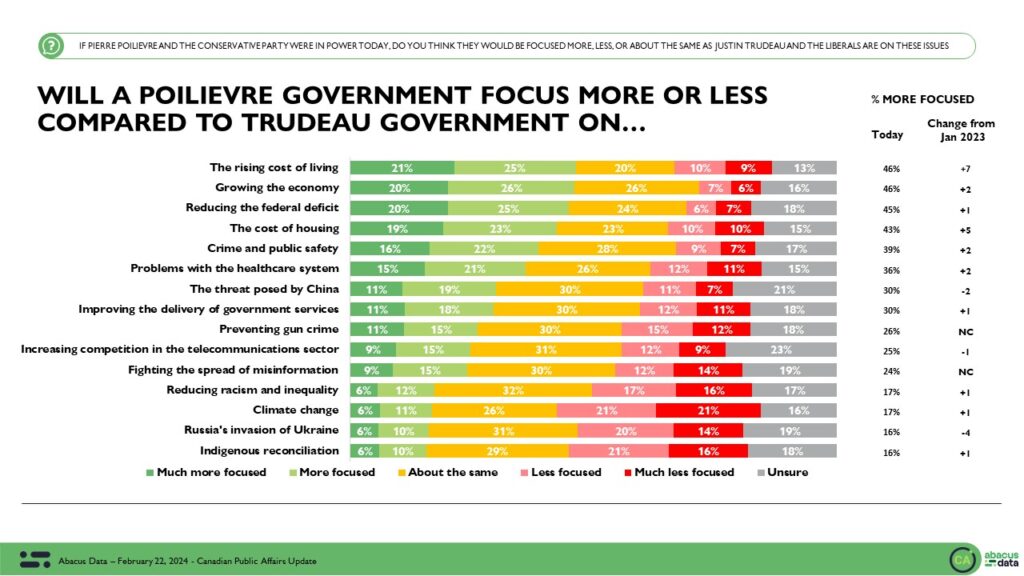
These results are noteworthy in a few ways:
- Heightened Concerns on Cost of Living and Housing: The fact that over 60% of Canadians believe the government is not sufficiently focused on critical issues like the cost of living, housing, and crime/public safety speaks volumes about public anxiety over these areas. The cost of living, identified as the top issue for three-quarters of Canadians, has seen a notable increase in concern, up 5 points from the previous year. This suggests a growing dissatisfaction with the government’s handling of economic pressures facing ordinary Canadians, especially in the context of housing affordability and safety.
- Perceived Overemphasis on Climate Change, Indigenous Reconciliation, and Ukraine: The polarization of public opinion on the government’s focus on climate change, indigenous reconciliation, and Russia’s invasion of Ukraine reveals a divide in what Canadians believe should be the government’s priorities. At least a quarter of Canadians feel that too much attention is given to these issues. This polarization, especially around climate change, highlights the challenge in balancing urgent environmental concerns with immediate economic pressures perceived by the public.
- Polarization on Climate Change: The fact that climate change emerges as the most polarizing issue, with nearly equal numbers of Canadians feeling the government is either too focused or not focused enough, underscores the complex public sentiment surrounding environmental policies. This polarization reflects broader global debates on climate action versus economic growth and how governments should navigate these often competing priorities. This presents opportunities and threats for both the Liberals and the Conservatives.
- Expectations for a Conservative Government’s Focus: The anticipation that a Conservative government would place greater emphasis on the cost of living, economic growth, deficit reduction, and housing affordability indicates a significant portion of the public perceives the Conservatives as potentially more attuned to their economic concerns. The increase in the percentage of Canadians who believe a Conservative government would focus more on these issues since last year suggests a shifting political landscape, possibly driven by ongoing economic challenges.
- Concerns over Conservative Focus on Climate Change and Foreign Policy: The expectation that a Conservative government would be less focused on climate change, indigenous reconciliation, and Russia’s invasion of Ukraine than the Liberal government reflects concerns about the potential deprioritization of these issues. The fact that Canadians believe the Conservatives would be less likely to focus on that issue suggests that some are paying attention to what’s happening in Ottawa and two, if the Conservatives divert their attention away from the core three – inflation, housing, and healthcare – they risk fracturing their newly built coalition.
The Upshot
According to Abacus Data CEO David Coletto: “The Auditor General’s report on the ArriveCan app does not seem to have fundamentally changed public opinion about the Liberal government or the Prime Minister – suggesting the Liberals and Mr. Trudeau may have hit the bottom of their support.
The political climate remains deeply challenging for the Liberals, highlighted by a significant lead for the Conservatives. This enduring lead in vote intention has now stretched to over 644 days in our tracking. The stability of this trend suggests a deep-rooted dissatisfaction and disappointment with the current government and one that does not appear to be improving at all.
This poll underscores a clear message from Canadians: there’s a significant disconnect between the government’s current priorities and the urgent issues of cost of living, housing, and public safety that matter most to the electorate. Any efforts the government has made to shift perceptions on his front has yet to make any impact.”
Looking to conduct polling or market research in 2024? Have budget left to spend before the end of March? Send Yvonne an email to connect with the Abacus Data team today!
Methodology
The survey was conducted with 2,125 Canadian adults from February 15 to 21, 2024. A random sample of panelists were invited to complete the survey from a set of partner panels based on the Lucid exchange platform. These partners are typically double opt-in survey panels, blended to manage out potential skews in the data from a single source.
The margin of error for a comparable probability-based random sample of the same size is +/- 2.1%, 19 times out of 20.
The data were weighted according to census data to ensure that the sample matched Canada’s population according to age, gender, educational attainment, and region. Totals may not add up to 100 due to rounding.
This survey was paid for by Abacus Data Inc.
Abacus Data follows the CRIC Public Opinion Research Standards and Disclosure Requirements that can be found here: https://canadianresearchinsightscouncil.ca/standards/
ABOUT ABACUS DATA
We are Canada’s most sought-after, influential, and impactful polling and market research firm. We are hired by many of North America’s most respected and influential brands and organizations.
We use the latest technology, sound science, and deep experience to generate top-flight research-based advice to our clients. We offer global research capacity with a strong focus on customer service, attention to detail, and exceptional value.
And we are growing throughout all parts of Canada and the United States and have capacity for new clients who want high quality research insights with enlightened hospitality.
Our record speaks for itself: we were one of the most accurate pollsters conducting research during the 2021 Canadian election following up on our outstanding record in the 2019, 2015, and 2011 federal elections.
Contact us with any questions.
Find out more about how we can help your organization by downloading our corporate profile and service offering.




